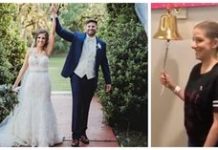
Legacies account for over a third of our total fundraising. The money people pledge to us in Wills is vital to our work and gives us the long-term financial stability we need to fund the most ambitious and game-changing research. Here, we speak with Elaine Whelan – who, along with husband Kilian, has pledged 10% of their estate to help fuel the research of tomorrow – about why she chose to support our work with a significant legacy pledge.
What inspired you to support our work?
My mum was diagnosed with breast cancer when she was just 45 and I was 17. She survived but was later diagnosed with lung cancer and passed away a number of years ago. I decided to set up a fundraising page in her memory – I still put money into it now to mark occasions like birthdays and Christmases.
The older I got, the more I realised how much cancer impacts people’s lives. The company I used to work for got behind Relay for Life when it first started and with the amount of support it received and the stories everybody had about their families and friends, it became more and more evident to me that cancer really does affect us all.
Then in 2017, my husband was diagnosed with advanced melanoma.
What areas of cancer research excite you most?
Because my mum passed away from lung cancer, I was originally interested in specific advancements being made in that area. Then after my husband was diagnosed, I learnt more about the work being done around immunotherapy, which I found interesting. I’m also excited about personalised medicine – providing tailored treatments to patients based on their genetic makeup. But the most important thing for me now is the ability to detect cancer early when treatments are more likely to be successful. The science behind early detection is critical to being able to save more lives.
I’m hopeful because COVID-19 has shown that getting the best scientific minds together and providing the right resources leads to amazing things. A lot of the developments that came out of COVID-19 were based on research into diseases like cancer, as well as the fundamentals of human biology. I don’t think the vaccines would have been developed anywhere near as quickly had it not been for the groundwork being done by cancer research facilities.
Why did you choose to leave a gift in your Will, and what would you say to other people considering it?
It’s an easy way to give, and to do something more meaningful than you might be able to in your lifetime, when financial decisions like buying a house and embarking on other projects can get in the way. When you’re gone, those things can no longer interfere. And once you make the decision and document it, that’s it – you just leave it there until it’s ready.
You’ve introduced us to your networks to help us reach new supporters. How important is it to you to use your connections to champion good causes?
I think people sometimes forget to support charities and about the good they do, so I like to remind them. There have been instances where I’ve been able to get professional and personal contacts of mine interested in Cancer Research UK, and if you can get hearts and minds behind you and then bring them along with you, together you can do a lot of good.
What does philanthropy mean to you?
I just try to do some good in areas I think need it. When you see tragic things happening and you’re fortunate enough to be able to give a lifetime or legacy donation, I think you should.
By leaving a gift in your Will, you can support future generations of cancer patients by fuelling the discoveries that lead to life-saving treatments. Email us to find out more.





